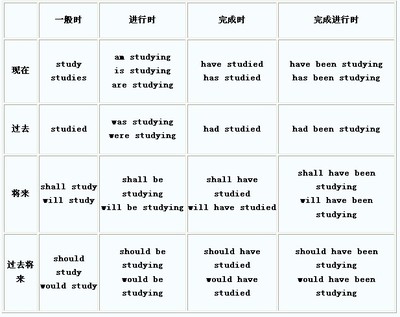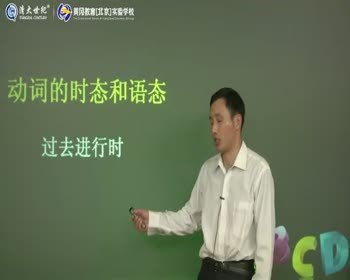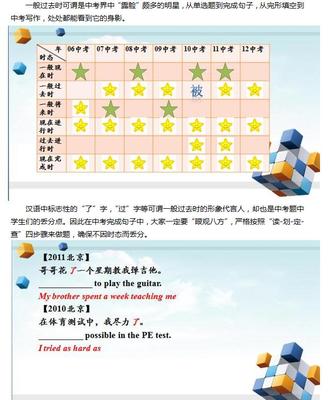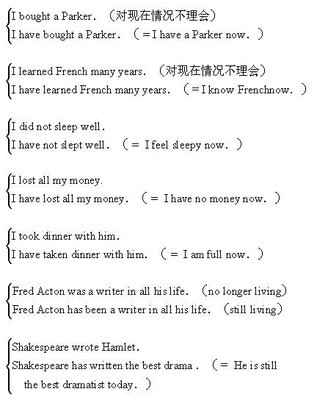在英语中,每句话都包含一定的时态,要学好英语就必须掌握英语中一些常用的时态。在英语中,不同时间发生的动作和情况,要用不同的动词形式表示.这种不同的时间和不同的动词形式就叫做动词的时态.换句话说,判断一个句子的时态,可以通过句子中的时间和动词的形态来判断。下面我就一般过去时作一些讲解,如有不妥之处,请指教。每种时态都有三个最基本的要素,分别是该时态的概念、结构、判断标志词。
一、 一般过去时的概念:
一般过去时用来表示过去某一时间内发生的动作或存在的状态以及过去习惯性、反复性的动作。谓语动词要用动词的过去式,常和表示过去的时间状语连用,如yesterday昨天、lastnight昨晚、last week上周、last year去年,等。
二、 一般过去时的结构:(可分三类不同的结构)
Ⅰ Be动词的一般过去时
在没有实义动词的句子中使用be动词, am is 的过去式为was; are的过去式为were
肯定句式:主语 + be(was , were) + 其它.
否定句式:主语 + be(was , were) + not + 其它.
一般疑问句:Be(was , were) + 主语 + 其它?
注:在这种构成中,be动词有人称和数的变化,即要根据主语选用was /were。Be动词分为单数和复数,was是表示单数,were是表示复数。
Ⅱ 实义动词的一般过去时态
肯定句要使用动词的过去式,否定句和疑问句要使用助动词do和 does 的过去式 did.
肯定句式:主语 + 动词(过去式)+ 其它
否定句式:主语 + didn’t + 动词(原形)+ 其它 【did not =didn’t】
一般疑问句:Did + 主语+ 动词(原形)+ 其它【do , does的过去时均为did】?
注:did和didn’t 是构成一般过去时的助动词,其特点是要在其后跟动词的原形。
Ⅲ 情态动词的一般过去时态
含有情态动词的一般过去时与含有Be动词的一般过去时,是十分相似,请注意观察。
肯定句式:主语 + 情态动词 + 其它.
否定句式:主语 + 情态动词 + not + 其它.
一般疑问句:情态动词 + 主语 + 其它?
注:情态动词的过去式:can→could , may→might , must→must 。
三、 一般过去时的判断标志词
yesterday , the day before yesterday , last + 时间 ,时间 + ago , just now , a moment ago , in + 过去的时间 , this morning ,and so on
四、 动词的过去式的构成规则和发音规则:
(一)规则动词的过去式
1.一般情况下,在动词原形后面加-ed。
look→lookedplay→played start→startedvisit→visited
2.以不发音e结尾的动词,在词尾直接加-d。
live→lived use→used
3.以“辅音字母+ y”结尾的动词,先将 y 改为i ,再加 –ed。
study→studied, try→triedfly→flied
4.以重读闭音节(即辅音+元音+辅音)或r音节结尾,末尾只有一个辅音字母的动词,要先双写这个辅音字母后,再加 –ed。
stop→stopped plan→planned, prefer→preferred
5.不规则动词的过去式需特殊记忆。如:am(is)-was, are-were, go-went,come-came, take-took, have (has)-had等
(二)加“-ed”后的读音方法
1.ed加在清辅音后面读/t/。
finished/-t/ help/-t/ asked /-t/
2.ed加在浊辅音或元音结尾的,读/d/。
played/-d/ lived/-d/ enjoyed/-d/
3.ed加在/t/或/d/后面,读/id/。
wanted/-tid/ needed/-did/visited /-tid/
五、 一般过去时的基本用法
① 一般过去时的用法
表示过去某个特定时间发生的动作或存在的状态。
He suddenly fell ill lastnight.
他昨晚突然病倒了。
We didn't have classesyesterday.
昨天我们没有上课。
② 一般过去时的用法
表示过去的习惯性或经常发生的动作。
She went to the cinema once a month when she was at school.
她上学时每个月去看一场电影。
When I was in the countryside, I often walked by theriverside.
我在乡下时经常在河边散步。
一般过去时表示过去经常或反复发生的动作,常和often经常,
always总是,once a week一周一次,等表示频度的时间状语连用。
③ 一般过去时的用法
叙述过去连续发生的一件件事。
She got up early, fetched water, cleaned the room and then went outfor a walk.
她早早起床,提水,打扫房间然后出去散步。
④ 一般过去时的用法
在条件、时间状语从句中代替一般过去将来时。
They said they would let me know as soon as they got there.
他们说只要他们一到达那儿就会马上让我知道的。
⑤ 一般过去时的用法
用于虚拟语气
If I were you.
如果我是你。(表示不可能)
Did you wish to see me?
你是找我吗?(表示委婉)
六、 一般过去时记忆口诀
一般过去时并不难,表示过去动作、状态记心间。
动词要用过去式,时间状语句末站。
否定句很简单,didn't 站在动词原形前,其它部分不要变。
一般疑问句也好变,did放在句子前,主语、动词原形、其它部分依次站。
特殊疑问句也简单,疑问词加一般疑问句记心间。
最后一条请注意,动词过去式要牢记。
七、 习题操练
Ⅰ.单项选择
1.Where __________ you born?
A.didB.had
C.wasD.were
2.Do you enjoy working? Yes, I do.I like __________.
A.busyB.very much
C.keeping busyD.busy
3.May I ask you __________ questions?
A.a littleB.any
C.someD.a
4.Last night my father __________ home very late.
A.reachedB.gets
C.reached toD.got to
5.When Jim was a child , they __________ to France.
A.livedB.worked
C.reachedD.moved
6.—__________ go and see the baby pandas?
—Good idea.
A.Let'sB.Can you
C.Shall weD.Do we
7.—Happy New Year!
—__________.
A.OK.B.How do you do?
C.The same to youD.How are you?
8.—How often are you ill?
—__________.
A.LastweekB.Sometimes
C.ThreedaysD.Less than a week
9.Wei Hua __________ a busy day yesterday.
A.hasB.had
C.wasD.have
10.When __________ you come here? We__________ here last week.
A.do;comeB.do;came
C.did;cameD.did;come
11. When Jim was a child, they _________ to France.
A.movesB.movingC.moved
12. Wei Hua _________ a busy day yesterday.
A.hasB.hadC. was
13. _________ you away from home yesterday morning?
A.DidB.WasC. Were
14. Sorry, Miss Huang, I _________ the key to the door of theclassroom at home. I have to go back
for it.
A.leftB.forgetC. lost
15. —_________? —It wasOctober 2nd.
A. What was the date yesterdayB. What day was itC. What is the date
II. 请用正确动词形式填空。
1. I _________ (have) an exciting party last weekend.
2. _________ she _________(practice) her guitaryesterday? No, she _________.
3. What ________ Tom ________ (do) on Saturdayevening?
He ________(watch) TVand__________(read) aninteresting book.
4. They all _________(go) to the mountains yesterday morning.
5. She _________(not visit) her aunt last weekend.
She ________ (stay) at homeand _________(do) some cleaning.
6. When ________ you _________(write) this song?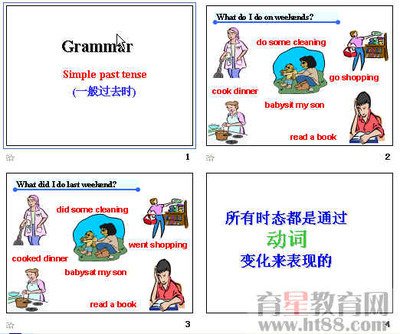
I __________(write) it lastyear.
7. My friend, Carol, ___________(study) for the math test and__________(practice) English last night.
8. ________ Mr. Li __________(do) the project on Mondaymorning? Yes, he_________.
9. How _________(be) Jim's weekend? It _________(be not) bad.
10. ________ (be) your mother a sales assistant lastyear? No. she ________
11.Tom and Mary ___________ (come) to China lastmonth.
12.Mike _________________(not go) to bed until 12o’clock last night. So I _______ (get ) up late.
13.Mary __________ (read) English yesterdaymorning.
14.There _________ (be) no one here a momentago.
15.I ___________ (call) Mike this morning.
16.I listened but ___________ (hear) nothing.
17.Tom ___________ (begin) to learn Chinese lastyear.
18.Last week we _________ (pick) many apples on thefarm.
19.My mother ________________ (not do) houseworkyesterday.
20. She watches TV every evening. But she_______________ (not watch) TV last night.
________ your father ________ ( go ) to work everyday last year?
21.--What time _______ you _______ (get) to Beijingyesterday?
--We __________ (get) to Beijing at 9:00 in theevening.
22. What __________ (make) him cry (哭) justnow?
23. Last year the teacher ___________ (tell) usthat the earth moves around the sun.
24. There ____________ a telephone call for lyoujust now. (be)
25. There __________ not enough people to pickapples that day. ( be)
26. There ________ any hospitals (医院) in myhometown (家乡) in 1940. ( be not)
27. There ____________ enough milk at home lastweek, wasn’t there?
28. Eli ____________ to Japan lastweek. ( move)
29. –When _______ you _________ (come) tochina?
--Last year.
30. Did she ________ (have) supper at home?
31. Jack ____________ (not clean) the room justnow.
32. _________ (be) it cold in your cityyesterday?
33. How many people ________ (be) there in yourclass last term?
34. It ________ (be) hot yesterday and mostchildren _______ (be) outside.
35. There ________ (be) a football match on TVyesterday evening, but I _________ (have) no time to watch it.
the keys:
Ⅰ.1.D 2.C3.C 4.A 5.D6.C 7.C 8.B9.B 10.C 11.C12.B 13.C14.A 15.A
II. 1.had 2.Did practiced, didn't 3.did do, watchedread 4.went 5.didn't visit, stayed, did 6.did write, wrote7.studied, practiced 8.Did do, did 9.was, wasn't 10.Was, shewasn't 11. came 12. didn’t go ,got 13. read 14.was 15. called 16.heard 17. began 18.picked 19. didn’t do 20. didn’twatch 21. did , get , got 22.made 23. told 24.was 25. were 26.weren’t 27. was 28.moved 29. did , come 30.have 31. didn’t clean 32.Was 33. were 34. was ,were 35. was , had
 爱华网
爱华网